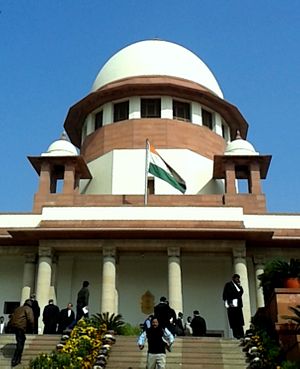In an attempt to crystallize at least two years of recurrent dialogue on the controversial practice of triple talaq, or verbal divorce in certain Muslim communities in India through the utterance of the word “talaq” three times, the Supreme Court of India has convened a five-judge constitutional bench. The bench will attempt to examine the validity of the practice, thus entering the murky territory of government legislation on personal religious law. The hearing is expected to conclude by May 19, 2017.
Members of the ruling Bharatiya Janata Party (BJP) have spoken out against the triple talaq practice repeatedly, as the issue is viewed along the continuum of the Uniform Civil Code (UCC), which was an important plank in all of the BJP’s electoral victories. Most recently, in the state of Uttar Pradesh, which has the largest parliamentary seat allocation in the country, abolishing triple talaq and establishing a UCC became important agenda items leading to the BJP’s landslide win.
The All India Muslim Personal Board (AIMPB) serves as a body that regulates and passes commentary regarding Indian Sunni Muslim personal law. In this case they have been vociferously against the ban. As a rule, the AIMPB resists and rejects state interference in religious personal law and has provided bizarre defenses against some critiques. In the case of the debate over allowing polygamy on religious grounds, for instance, they argued that women in Muslim society outnumbered the men, and thus polygamy was effective protection against the potential spinsterhood of women. In this case, they argued that without triple talaq the men would find worse ways of getting rid of their wives.
What this argument however does not dispute is the inherent patriarchal context that the triple talaq practice operates within. This context is not glossed over by the multiple women’s boards and forums that have joined the call for the abolition of the practice. While the AIMPB has invested in a signature campaign with truckloads of supporters decrying the invalidation of the custom, even some women within the organization have supported the call for its ban.
A study by the Bharatiya Muslim Mahila Andolan (BMMA) indicates that over 90 percent of the women they surveyed called for an abolition of the practice. The common understanding seems to be that triple talaq has increased in incidence over the past three decades – cutting out any opportunity to discuss things like child rights and alimony in the event of the divorce. To make things worse, cases of the meting out of unilateral divorce over email, social media, etc., have been on the rise and ultimately led to the set of cases that called for Supreme Court review.
The bench has members belonging to five different religions, including Islam, but is notably an all-male panel. This has not escaped critique by women’s rights groups as well as the media, who have both viewed this as an opportunity to also point to the troubling gender ratio of women in the Indian judiciary. Out of 28 Supreme Court judges in fact, only one is a woman. The male panel in this case, however, in its first few sittings, has already heard strong declarations that equate triple talaq to burying women alive and other brutal, feudal customs.
Former union minister and senior counsel Arif Mohammed Khan has been one of the most vociferous opponents of the practice. He previously resigned from the Rajiv Gandhi government in protest of the Congress Party’s willingness to overturn the favorable alimony verdict in another case of Muslim divorce – the infamous Shah Bano case. He has indicated that the practice is against the Indian Constitution, the Quran, and even the standards of humanity. Others have equated the practice to the death penalty and gone on to call it the worst form of marriage dissolution.
The question of how integral triple talaq is to the practice of Muslim personal law has now become inextricable from discussions on its validity. At the risk of superimposing authenticity, both the AIMPB and the triple talaq opponent camps have drawn on the Quran, its verses, and scholarly discussions to determine whether the court should intervene. On the other hand, there is also a prominent rights narrative that attempts to take down the practice given how much it disempowers women and strips them of agency.
The problem, however, is complicated by the politicization of the discussion around triple talaq. It is perhaps not possible to entirely divorce an issue as political as a church vs. state battle from politics. As triple talaq begins to increasingly become associated with the BJP’s call for a UCC in India, the polarities grow wider. The fear of imposition of a seemingly secular Hindu law coupled with the loss of power clerics shall face, should a precedent be set, amplifies this polarity.
What has perhaps taken a back seat in all this is the question of what the courts must do when religious law is at odds with fundamental rights. It is imperative that the verdict tackle this larger question, through the deliberations of the panel. If the ultimate decision limits itself to the narrowness of the issue without providing context to how such dilemmas operate beyond this case and this religion, an opportunity may well be lost.

































